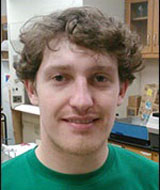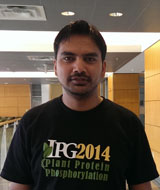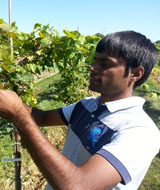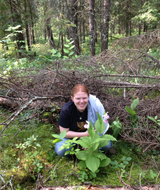Grad Student & Post Doc Directory
C | D | G | H | J | K | L | M | N | P | R | S | T | U | V | W | Y

Yangrong Cao
Post Doctoral Fellow
Division of Plant Sciences
E-mail: caoy@missouri.edu
Standard Techniques: Molecular biology, Protein purification, Immunoblotting Techniques
Other Techniques: Protoplast Isolation,Pathogen Challenge Assays
Model Systems: Arabidopsis,Grape
Research: Chitin-triggered innate immunity in plants

Ryan N. Douglas
Post Doctoral Fellow
Division of Biological Sciences
E-mail: douglasrn@missouri.edu
Standard Techniques: Molecular biology, Genetics, Microscopy, qPCR
Other Techniques: Chromatin Immunoprecipitation,In situ hybridization,Fluorescence in situ hybridization, RNAseq
Model Systems: Maize,Informatics
Statistical Packages: R
Research: I have created a unique series of active, inactive, and reactivated centromeres to study epigenetic aspects involved in specifying maize centromere function. I am utilizing next-generation technologies such as RNAseq and ChIP-seq to examine our series of centromeres.
I have also been involved in the de novo assembly of the supernumerary maize B chromosome and I am investigating RNA transcription originating from the B chromosome.

Tyler G. Dowd
Ph.D. Graduate Student
Division of Plant Sciences
E-mail: tgd7c4@mail.missouri.edu
Standard Techniques: Isopiestic Thermocouple Psychrometry
Model Systems: Maize
Statistical Packages: Minitab
Programming Languages: Perl
Analysis Programs: WinRhizo
Research: My project is focused on architectural changes in root morphology arising due to water deficits. Specifically, I am focusing on the role of carbon partitioning in lateral root proliferation in response to mild and severe water deficits utilizing the model system maize. The goal of this work is to understand the developmental adaptions of root system growth under water-limited conditions and to use this insight to improve the production and survival of crops in water-stressed environments.

Michael N. Gardner
Ph.D. Graduate Student
Division of Plant Sciences
E-mail: mng7f3@mail.missouri.edu
Standard Techniques: Molecular biology, qPCR, Yeast two-hybrid
Other Techniques: Pathogen Challenge Assays
Model Systems: Soybean
Programming Languages: Perl
Research: My research focuses on the ability of the soybean cyst nematode (SCN), a pathogen of soybean, to adapt and overcome resistance in the plant. In order to examine this comparative transcriptomic analysis is being performed between SCN populations adapted and non-adapted to resistance.

Nat D. Graham
Ph.D. Graduate Student
Division of Biological Sciences
E-mail: ndgraham@mail.missouri.edu
Standard Techniques: Molecular biology, Genetics, Plant Transformation
Other Techniques: In situ hybridization,Fluorescence in situ hybridization
Model Systems: Maize
Research: I work on creating large-sized mini-chromosomes in maize using bacterial artificial chromosome vectors.

Morgan K. Halane
Ph.D. Graduate Student
Division of Plant Sciences
E-mail: mkhbnd@mail.missouri.edu
Standard Techniques: Molecular biology, Immunoblotting Techniques
Other Techniques: Pathogen Challenge Assays
Model Systems: Arabidopsis,Grape, Pseudomonas
Statistical Packages: Minitab
Research: Like humans, plants can become infected with a variety of pathogens including viruses, fungi, and bacteria. Agronomic crop losses due to disease in susceptible plants is a serious problem worldwide which is compounded by a growing population expected to reach nearly ten billion by 2050. As a student in Walter Gassmann’s lab, my research focuses on the molecular mechanisms by which plants can detect pathogens and ramp up a robust immune response in defense. I am specifically focused on the roles of a secreted bacterial effector protein (AvrRps4) which benefits the bacterium on a susceptible host but can betray the pathogen to a resistant host’s surveillance system when detected by a set of plant resistance proteins.

Benjamin T. Julius
Ph.D. Graduate Student
Division of Biological Sciences
E-mail: btjg2d@mail.missouri.edu
Standard Techniques: Molecular biology, Genetics
Other Techniques: Scanning electron microscope
Model Systems: Maize
Programming Languages: Python
Research: Exploring the genetic control of carbon partitioning in maize. I am working to determine the funcional role of SWEET sucrose effluxers in phloem loading as well as characterizing genes responsible for mutants that hyperaccumulate starch and soluble sugars.

Jian Kang
M.S. Graduate Student
Division of Biological Sciences
E-mail: jkf64@mail.missouri.edu
Model Systems: Maize, Cotton
Research: What my project focusing is that we propose to initiate a comprehensive analysis of the physiological processes involved in root growth adaptation to water stress in cotton. What Sharp’s lab has done on maize and soybean root system development has utilized model systems in which seedlings are exposed to precise and constant water deficits; accordingly, after a period of acclimation, the seedlings exhibit steady and reproducible responses of root growth and development. This system will be used to develop and utilize seedling model systems for precise characterization of cotton primary and lateral root growth characteristics under water deficit conditions. Several cotton genotypes will be tested within this system and the genotypes with contrasting responses of root growth and development under water deficit conditions will then be selected for detailed physiological analysis. In future studies, we will explore the physiological and genetic mechanisms involved in regulating the root growth responses.

Avi Karn
Ph.D. Graduate Student
Division of Plant Sciences
E-mail: akarn@mail.missouri.edu
Standard Techniques: Molecular biology, Genetics, Phenomics
Other Techniques: Nuclear magnetic resonance,High-performance liquid chromatography, Near Infrared Reflectance and Transmittance spectroscopy, Gentoype-By-Sequenceing, Circos
Model Systems: Maize
Statistical Packages: SAS,R, R/QTL
Programming Languages: Perl
Analysis Programs: TASSEL
Research: I study plant breeding, genetics and genomics at MU. My model organisms are maize and teosinte and population derived from maize x teosinte. My project areas involve discovering novel alleles for kernel compositions, and novel epsistatic interactions to improve various agronomic and geo-climatic adaptation traits in crops.

Mather A. Khan
Post Doctoral Fellow
Division of Plant Sciences
E-mail: khanma@missouri.edu
Standard Techniques: Molecular biology, Immunoblotting Techniques, Genetics, Plant Transformation, qPCR, Yeast transformation, Yeast Colony PCR, Functional screening of genes
Other Techniques: Gene silencing,Gas chromatography,High-performance liquid chromatography, ICP-OES
Model Systems: Arabidopsis,Grape
Research: Plants and seeds are the main dietary source of essential micronutrients (Zn, Fe, Cu, and Mn) for humans and livestock but also the main entry point for toxic elements (Cd, Pb, As, and Hg) into the food chain. Consumption of heavy metal contaminated food is among the major concerns for global food security. According to the Food and Agricultural Organization (FAO), crop productions will need to increase by 70% to feed over 9 billion people by 2050. Any effort devoted to increase yield has to ensure that the nutritional value of seeds and grains is retained or, preferably, improved. Understanding the fundamentals of growth and development of plants is of the utmost importance in order to meet the global demands for food. Uptake and distribution of nutrients and water from the soil and within the plant tissues is a dynamic process driven by root uptake transporters. Therefore, transporters are among the key target in developing crop plants with higher yield, rich nutrient value and tolerance to adverse environmental conditions.
My research, mainly focus on to characterize transporters responsible for long distance movement of different molecules including essential and toxic metals. We have identified and cloned 70+ Arabidopsis transporters preferentially expressed in companion cells, and assembled a functional expression library of these phloem transporters using yeast as heterologous expression system. This library is being instrumental to identify transporters mediating mobilization of essential and toxic metals from leaves to seeds.

Erica LaMontagne
Ph.D. Graduate Student
Department of Biochemistry
E-mail: edlmt9@mail.missouri.edu
Standard Techniques: Molecular biology, Immunoblotting Techniques, Genetics, Cell Fractionation
Model Systems: Arabidopsis,Maize,Grape
Research: My research focuses on characterizing the roles of different protein components in plant innate immunity against bacterial pathogens.

Carrie Miranda
Ph.D. Graduate Student
Division of Plant Sciences
E-mail: cmwbf@mail.missouri.edu
Standard Techniques: Molecular biology, Protein purification, Genetics, Tissue Culture
Model Systems: Soybean
Research:

Linh T. Ngo
Ph.D. Graduate Student
Genetics Area Program
E-mail: ltn887@mail.missouri.edu
Standard Techniques: Molecular biology, Genetics
Other Techniques: Pathogen Challenge Assays, Image processing
Model Systems: Arabidopsis,Maize,Nicotiana,Grape,Informatics
Statistical Packages: SAS,R, MatLab
Programming Languages: Pearl, Prolog
Research: Direct quote from our lab website:
We want to:
- understand the mechanisms and patterning of lesion formation, a crucial subsystem in plant defenses against pathogens; and
- develop better algorithms to infer networks of biochemical reactions from experimental data.
Complex Phenotypes: Understanding the mechanisms of complex phenotypes remains one of the most important problems of biology. Many developmental processes form structures that are patterned in space, time, or both. The maize disease lesion mimic mutants exemplify phenotypic complexity: the 75 extant maize mutants all form spatially and temporally patterned distributions of spots on leaves. The lesions themselves vary in number, size, type, shape, behavior, and many other characteristics that distinguish the related phenotypes from each other. Significantly, the patterns observed so far fall into perhaps twenty distinct families, hundreds of orders of magnitude less than would be naïvely expected from simply combining different phenotypic characteristics.
Network Inference: Systems biology seems an obvious approach to elucidating the mechanisms of lesion formation. But even if perfect molecular data were available, the greater challenge would be to infer the network from the high through-put data. While significant progress has been made, computationally inferring networks from experimental data remains very difficult for many organisms. Problems such as combinatorially exploding hypotheses, causality determination, recognition of physiologically significant variation, mismatches between the resolution of the data and their inferential power, and lumping complex phenotypes into a single measure often make it hard to extend causal chains very far. The lesion mimic mutants provide a unique opportunity to develop network inference algorithms in a system large enough to be challenging and small enough to be ultimately tested against genetic, physiological, and biochemical experiments.
More here: http://www.maizelesions.org/kazic.html

Nga T. Nguyen
Ph.D. Graduate Student
Division of Plant Sciences
E-mail: ntnwbc@mail.missouri.edu
Standard Techniques: Molecular biology
Other Techniques: ICP-OES
Model Systems: Arabidopsis,Grape
Research: Cadmium partitioning in Arabidopsis

Gunvant Patil
Post Doctoral Fellow
Division of Plant Sciences
E-mail: patilg at missouri dot edu
Standard Techniques: Molecular Biology, genetic engineering, tissue culture
Research: Soybean oil improvment

Silvas J. Prince
Post Doctoral Fellow
Division of Plant Sciences
E-mail: princesj@missouri.edu
Standard Techniques: Molecular biology, Genetics, Microscopy, qPCR
Model Systems: Arabidopsis,Soybean,Grape
Statistical Packages: SAS,SPSS,R
Research: Dissecting genes regulating root growth and plasticity in drought and flooding stress using omics and sequencing approaches

Kara J. Riggs
Ph.D. Graduate Student
Division of Plant Sciences
E-mail: kjr8h9 at mail dot missouri dot edu
Standard Techniques: Microscopy (confocal), Isopiestic thermocouple psychrometry for tissue and soil water potentials
Other Techniques: Gas chromatography
Model Systems: Maize
Analysis Programs: WinRhizo
Research: My research focuses on the hormonal regulation of maize nodal root growth under water deficit conditions. Maize nodal roots are known to have a superior ability to continue elongation at low water potentials, but the physiology of this response has been little studied. I am using a divided-chamber model system to characterize nodal root growth responses to a range of soil water potentials under steady-state and reproducible conditions.

Surya D. Sapkota
Ph.D. Graduate Student
Division of Plant Sciences
E-mail: sds3h6@mail.missouri.edu
Standard Techniques: Molecular biology, Genetics, Microscopy, Viticulture and Enology
Model Systems: Soybean
Research: My work mostly focuses on breeding and genetics of both annual and perennial crops using both traditional and modern breeding methods.Modern breeding methods includes use of molecular markers for marker assisted selection and QTL analysis.

John M. Smith
Ph.D. Graduate Student
Division of Plant Sciences
E-mail: jmsh4d@mail.missouri.edu
Standard Techniques: Molecular biology, Immunoblotting Techniques, Genetics, Cell Fractionation, qPCR
Other Techniques: Pathogen Challenge Assays
Model Systems: Arabidopsis,Grape
Research:

Isaiah Taylor
Ph.D. Graduate Student
Division of Biological Sciences
E-mail: iwtwb8@mail.missouri.edu
Standard Techniques: Molecular biology, Genetics, Plant Transformation, Mutant identification by genome sequencing in Arabidopsis, protein kinase biochemistry
Model Systems: Arabidopsis,Grape
Programming Languages: Perl
Research: I study signaling mechanisms that regulate organ abscission in Arabidopsis.

Sarah A. Unruh
Ph.D. Graduate Student
Division of Biological Sciences
E-mail: sauvd3@mail.missouri.edu
Standard Techniques: Molecular biology, Phylogenetic analysis
Model Systems: Informatics, Orchids and orchid mycorrhizal fungi
Research: I study genome evolution of orchids and their mycorrhizal fungi.

Priya Voothuluru
Post Doctoral Fellow
Division of Plant Sciences
E-mail: voothulurup@missouri.edu
Standard Techniques: Protein purification, Immunoblotting Techniques, Genetics, Microscopy, qPCR, Growth Kinematics, Isopiestic thermocouple psychrometry
Other Techniques: Transmission electron microscopy
Model Systems: Arabidopsis,Maize,Soybean,Grape
Research: I am interested in studying the mechanisms involved in abiotic and biotic stress tolerance in plants. My current research in the Sharp lab is to understand the mechanistic basis of root growth maintenance under water stress by using plant physiology and genomic tools. The long term goal of my current research is to produce plants with enhanced root system development under drought conditions.

Yongqin Wang
Post Doctoral Fellow
Division of Plant Sciences
E-mail: wangyq at missouri dot edu
Standard Techniques: Molecular biology, Genetics, Cellular biology
Research: I am mainly focusing on how genes are involved in regulation of soybean growth and survival under drought conditions. RNA Seq, soybean hairy root transformation, BPMV induced gene silencing in soybean and over-expression of soybean candidate genes in Arabidopsis to test gene function are major methods used in my current study. I also work on root specific up-regulation or knock-down of genes in order to generate stable transgenic soybean lines with improved yield stability under drought conditions by enhancing deep rooting capacity and early seedling vigor.

Abou Yobi
Post Doctoral Fellow
Division of Plant Sciences
E-mail: abou.yobi@ars.usda.gov OR yobia@missouri.edu
Standard Techniques: Molecular biology, Plant Transformation, qPCR
Other Techniques: Gas chromatography,High-performance liquid chromatography,Mass spectrometry
Model Systems: Maize, Sporobolus
Research: